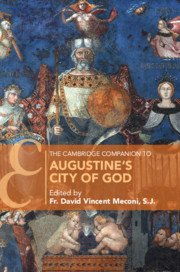Book contents
- The Cambridge Companion to Augustine’s City of God
- Cambridge Companions to Religion
- The Cambridge Companion to Augustine’s City of God
- Copyright page
- Dedication
- Contents
- Notes on Contributors
- Preface
- Abbreviations: Works by Augustine
- 1 Introduction
- 2 Book 1
- 3 Book 2
- 4 Book 3
- 5 Books 4 & 5
- 6 Books 6 & 7
- 7 Books 8–10
- 8 Books 11 & 12
- 9 Books 13 & 14
- 10 Books 15 & 16
- 11 Books 17 & 18
- 12 Book 19
- 13 Book 20
- 14 Books 21 & 22
- 15 Epilogue
- References
- Index
- References
6 - Books 6 & 7
Nature, Convention, Civil Religion, and Politics
Published online by Cambridge University Press: 21 August 2021
- The Cambridge Companion to Augustine’s City of God
- Cambridge Companions to Religion
- The Cambridge Companion to Augustine’s City of God
- Copyright page
- Dedication
- Contents
- Notes on Contributors
- Preface
- Abbreviations: Works by Augustine
- 1 Introduction
- 2 Book 1
- 3 Book 2
- 4 Book 3
- 5 Books 4 & 5
- 6 Books 6 & 7
- 7 Books 8–10
- 8 Books 11 & 12
- 9 Books 13 & 14
- 10 Books 15 & 16
- 11 Books 17 & 18
- 12 Book 19
- 13 Book 20
- 14 Books 21 & 22
- 15 Epilogue
- References
- Index
- References
Summary
In ciu. Dei 6 and 7, Augustine turns from addressing arguments that Rome’s traditional pagan cult is requisite for the this-worldly prosperity of the city and its empire, to the prospects of these rituals conducing to personal well-being after death. Books 6 and 7 form a bridge between Augustine’s history of pre-Christian Rome in all its glory and its misery, and his consideration of philosophic or natural theology, especially accounts offered by the Platonic school, and the place it makes for traditional pagan worship. The main material from which this bridge is made, according to leading pagan intellectuals like Marcus Terentius Varro, is the traditional Roman civil religion. Varro variously presents Rome’s traditional civil religion as framed by its founders for political utility on the one hand, and philosophic pedagogy on the other. Civil theology and its rites thus understood bind mythic pagan deities and popular views of their intervention on behalf of Rome to a naturalistic, pantheist account of God or the gods as the world itself or its soul. As Augustine interprets Varro, the latter lends his learned, public-spirited support to the civil cult, even while directing thoughtful readers beyond it to philosophic or natural theology. Varro is thus an indispensable interlocutor for Augustine in completing the political-historical-religious inquiry of ciu. Dei 1–5, and in preparing for the engagement with Platonic natural theology in Books 8–10.
- Type
- Chapter
- Information
- The Cambridge Companion to Augustine's City of God , pp. 102 - 121Publisher: Cambridge University PressPrint publication year: 2021

